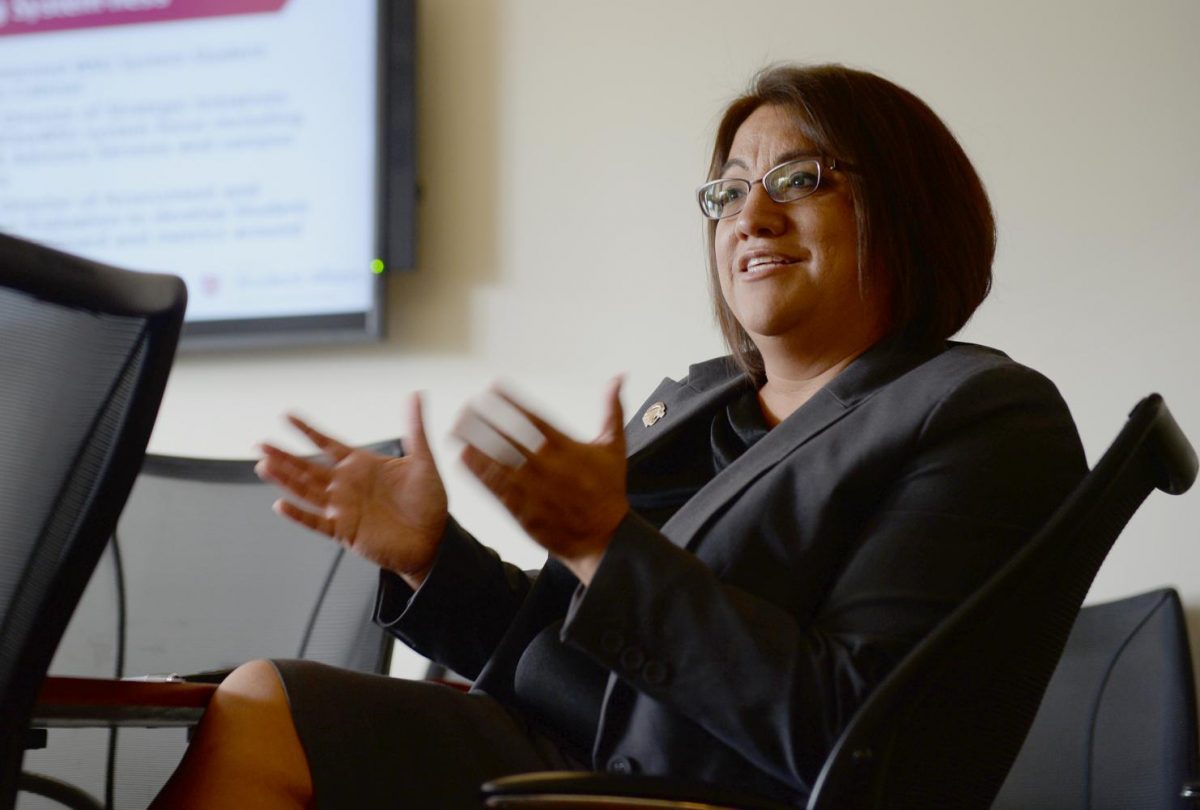Student affairs to unveil new conduct policies
Administrators will discuss possible changes at forum Wednesday
MICHAEL LINDER | The Daily Evergreen
Vice President of Student Affairs Mary Jo Gonzales discusses changes to the student conduct process at the Board of Regents meeting Sept. 21
October 2, 2017
A university task force will propose changes to the rules governing student conduct Wednesday.
Mary Jo Gonzales, vice president for Student Affairs and member of the student conduct process Task Force, said the task force focused most of its efforts on clearing up issues with due process and eliminating bias.
The task force has drafted a “presumption of non-responsibility” statement that would be read to students before their hearings, Gonzales said. The statement was intended to make clear to students that it is not their responsibility to prove innocence, but the university’s responsibility to prove guilt.
To avoid more conflicts of interest, she said, the task force drafted proposals to allow students to remove one member from the conduct board hearing their case, if the student felt the member was unable to rule fairly and equitably.
In attempt to build a less biased process, Gonzales said, the task force would propose bringing in conduct advisers to clear up any misunderstandings of the system.
She said this came from a concern that the Dean of Students, who supervises student conduct, was the only resource available for advice on the process.
Gonzales said the task force would propose forming a committee to select members of the conduct board. Student conduct staff and Student Affairs staff currently choose who is on the board. Gonzales said taking selection out of their hands, could further avoid conflicts of interest, and diversify the pool of candidates for board positions.
One area where members of the task force did not reach consensus was on how to hold groups accountable, she said. They needed to iron out how they planned on measuring and establishing standards for group accountability. Some believed student organizations should only face loss of recognition for hazing, Gonzales said.
Along with Wednesday’s forum, Gonzales said she would travel to every campus in the WSU system throughout October for public feedback on the proposals.
The university has been operating under a set of “emergency rules” since last December’s Court of Appeals decision. According to the current rules, WSU must send cases in which a registered student organization could lose recognition, a student faces suspension of at least ten days, or expulsion to state-appointed administrative law judges.
Administrative law judges are currently handling 26 WSU-related cases, said Tarisse Injerd, public information officer for the Office of Administrative Hearings in Olympia.
Regent Ryan Durkan, who chairs the Strategic and Operational Excellence Committee, said a student conduct handbook was in the works to explain the policies in understandable language.
Gonzales also spoke on possible changes to student conduct processes at last week’s Board of Regents meetings.
She said some of the proposals regarding legal representation stemmed from a December 2016 decision in which the Washington State Court of Appeals ruled that WSU violated a student’s rights when it did not allow his lawyer to speak on his behalf.
Abdullatif Arishi, a then 40-year-old graduate student, was charged with violating WSU’s code of conduct, after charges were filed for sexual contact with a person under the age of consent. The university barred him from questioning witnesses, and issuing subpoenas during his initial hearing in 2014.
University President Kirk Schulz commended the task force for its efforts.
“Although the fall semester issues around student conduct were not pleasant, I think what it did was it shown a light,” Schulz said. “We really needed a comprehensive review.”
Schulz also supported the idea of frequent internal reviews.
“We can’t use the same exact stuff for the next decade,” he said. “We have to continue to tweak and modify.”





















